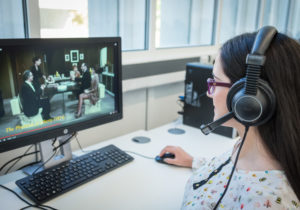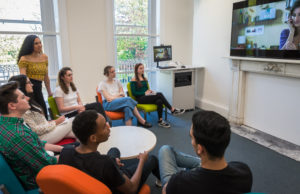Film Studies
UCAS code P303
- Study mode
- Full-time
- Duration
- 3 years
- Start date and application deadlines
-
- Start date
UCAS code P303
Films have been vital cultural outputs for over one hundred years. The context in which they are produced and distributed is constantly changing but their importance as documents of our times remains, as does the pleasure they give to audiences across the world and their potential influence on the way those audiences may see the world.
Film Studies at Liverpool offers you the chance to study with recognised scholars of film cultures and industries around the world, offering a wide-ranging and sophisticated academic programme in this critical field.
Our students have an interest in world cultures and a desire to fully appreciate the ways in which these cultures have expressed themselves through film. We encourage you to become an independent learner and can offer a variety of support to aid this development.
Students develop a high level of creative, intellectual, analytical, digital and interpersonal employability skills as well as intercultural and transnational awareness.

We’re proud to announce we’ve been awarded a Gold rating for educational excellence.
Discover what you'll learn, what you'll study, and how you'll be taught and assessed.
Year one introduces you to film language, approaches to film and a variety of introductory language modules.
Students take 45 credits of required modules and 15 credits of optional modules in each semester.
Language modules must be taken in pairs.
Programme details and modules listed are illustrative only and subject to change.
Year two gives you the opportunity to specialise your interests and start to focus your degree into specific areas that you would like to learn more about.
Students take 15 credits of required modules and 45 credits of optional modules in each semester.
Students cannot take more than 60 credits of COMM and/or MUSI optional modules per year. An additional 15 credits may be taken from COMM and/or MUSI optional modules or from cognate subjects elsewhere in the School of Histories, Languages and Cultures with prior permission from the Subject Lead.
Normally, students wishing to take MUSI205 should have taken MUSI109 or have equivalent experience.
Students wishing to take MUSI206 must have taken MUSI106, MUSI107, and/or MUSI109 or have equivalent experience as approved by the Module Convenor.
FILM200 is subject to a suitable placement being sourced. Students cannot register for this module directly.
Registration onto HLAC220 is only for students planning to undertake a Work Placement Year.
| Compulsory modules | Credits |
|---|---|
| CRITICAL APPROACHES TO SCREEN STUDIES (FILM204) | 15 |
| THE CINEMATIC CITY (FILM201) | 15 |
Programme details and modules listed are illustrative only and subject to change.
Year three modules allow you to specialise further; you will either undertake a research project or dissertation, undertaking detailed and independent research.
Students take 60 credits of optional modules in each semester.
Students must take one of MODL321, MODL322 or MODL307.
MODL307 is a ‘year-long’ module and represents 15 credits in each semester. Students should normally have a year two average of 60% to undertake this module.
Programme details and modules listed are illustrative only and subject to change.
You can take Film Studies as part of a combined degree. If you study Film Studies and another subject (50/50) you will take 60 credits in Film per year.
In year one you will take FILM101, FILM104, FILM102 and MUSI170.
In year two you will take 15 credits of required and 15 credits of optional Film Studies modules in each semester. FILM201 and FILM204 are the required modules.
In year three you will take 30 credits of optional Film Studies modules in each semester. In year three you may do a dissertation module in Film Studies or in your other joint subject (but not both).
You will experience a mix of lectures, seminars, workshops and tutorials, with no modules being taught entirely through lectures. Most teaching takes place in small groups where you’ll share and explore ideas with your tutors and peers. You’ll also attend workshops and lectures and self-direct study through the course reading list and conducting research for your essays and projects. Academic staff are available on a weekly basis for one-to-one feedback and support through designated office hours. Course material is available 24-hours a day on Canvas, our online learning platform, and study support is available from our dedicated student services team.
Audio-visual materials are obviously inherent in a film studies course: all films are shown to students once in quasi-cinema conditions, and DVD copies are available for subsequent private study.
Students are also expected to make regular use of our fully-refurbished Language Lounge which houses a range of Film Studies material to enhance their own study. We encourage our students to become independent learners, and support them through our dedicated library resources in the Sydney Jones Library which is open 24-hour in term time.
Assessment strategies vary with different modules; apart from traditional written examinations and assessed essays, assignments may include close analysis of short pieces of film text, sometimes in exam conditions; presentations undertaken either individually or as part of a group; the preparation of case studies around a particular audio-visual project; blog entries; brief reports; literature reviews and others. We are constantly reviewing our assessment strategies with the aim of offering a variety which allow students to develop different skills. The length and complexity of coursework assessments increases from year one, where written work is brief and skills are developed at a basic level, to year three when students are expected to produce quite complex work involving substantial individual initiative.
We have a distinctive approach to education, the Liverpool Curriculum Framework, which focuses on research-connected teaching, active learning, and authentic assessment to ensure our students graduate as digitally fluent and confident global citizens.
The Liverpool Curriculum framework sets out our distinctive approach to education. Our teaching staff support our students to develop academic knowledge, skills, and understanding alongside our graduate attributes:
Our curriculum is characterised by the three Liverpool Hallmarks:
All this is underpinned by our core value of inclusivity and commitment to providing a curriculum that is accessible to all students.
The qualifications and exam results you'll need to apply for this course.
| Qualification | Details |
|---|---|
| A levels |
BBC |
| BTEC Level 3 national extended diploma |
DDM. |
| BTEC combinations |
BTEC National Diploma DM plus B at A level; BTEC National Extended Certificate M plus BB at A level. |
| Welsh Baccalaureate Advanced |
C in the Welsh Baccalaureate, plus BB at A level. |
| Access |
Pass relevant Access to HE Diploma with 45 Level 3 credits with 27 at Distinction and 18 at Merit. |
Studying with us means you can tailor your degree to suit you. Here's what is available on this course.
University of Liverpool students can choose from an exciting range of study placements at partner universities worldwide. Choose to spend a year at XJTLU in China or a year or semester at an institution of your choice.
Immerse yourself in Chinese culture on an optional additional year at Xi'an Jiaotong Liverpool University in stunning Suzhou.
Broaden your world by spending an additional year of study at a partner university abroad following your second year of study.
Take a semester of your second year of study at one of our worldwide partner institutions.
Spend a summer abroad on a study placement or research project at one of our worldwide partner institutions.
Every student at The University of Liverpool can study a language as part of, or alongside their degree. You can choose:
With a combined degree, you can study two subjects as part of the same degree programme.
Explore combined degrees for Communication, Film and Media courses
Film Studies is part of the Department of Languages, Cultures and Film, based in 1-7 Abercromby Square. Students experience teaching across a number of departments, and have access to a variety of Film Studies resources in the department’s Language Lounge for independent study.






From arrival to alumni, we’re with you all the way:

Want to find out more about student life?
Chat with our student ambassadors and ask any questions you have.
The industry specific knowledge that you can acquire from a Film Studies degree will prepare you for a wide range of film-related careers in production, distribution, marketing, film writing and more broadly in media-related careers locally, nationally and internationally.
The programme more broadly allows students to develop transferable skills – critical thinking, writing and communication skills, presentation skills, independent research – which are crucial for a variety of careers beyond film and media.
Career paths could include:
82% of languages, cultures and film students are in work and/or further study 15 months after graduation.
(Discover Uni, 2018-19.)
Your tuition fees, funding your studies, and other costs to consider.
Full-time place, per year - £9,535
Year abroad fee - £1,430 (applies to year in China)
Full-time place, per year - £24,100
Year abroad fee - £12,050 (applies to year in China)
The tuition fees shown are correct for 2025/26 entry. Please note that the year abroad fee also applies to the year in China.
Tuition fees cover the cost of your teaching and assessment, operating facilities such as libraries, IT equipment, and access to academic and personal support. Learn more about paying for your studies.
We understand that budgeting for your time at university is important, and we want to make sure you understand any course-related costs that are not covered by your tuition fee. This could include buying a laptop, books, or stationery.
Find out more about the additional study costs that may apply to this course.
We offer a range of scholarships and bursaries that could help pay your tuition and living expenses.
If you’re a UK student joining an undergraduate degree and have a household income below £35,000, you could be eligible for a Liverpool Bursary worth up to £2,000 for each year of undergraduate study.
Apply for an Asylum Seekers Scholarship and you could have your tuition fees paid in full and receive help with study costs. You’ll need to have applied for asylum in the UK, or be the dependant of an asylum seeker, and be joining an eligible undergraduate degree.
If you’ve spent 13 or more weeks in Local Authority care since age 14, you could be eligible for a bursary of £3,000 per year of study. You’ll need to be a UK student joining an eligible undergraduate degree and be aged 28 or above on 1 September in the year you start.
Are you a UK student with a Black African or Caribbean heritage and a household income of £25,000 or less? You could be eligible to apply for a Cowrie Foundation Scholarship worth up to £8,000 for each year of undergraduate study.
If you’re a UK student identified as estranged by Student Finance England (or the equivalent UK funding body), you could be eligible for a bursary of £1,000 for each year of undergraduate study.
Joining a School of Biosciences degree and have a household income of less than £25,000? If you’re a UK student, you could apply to receive £4,500 per year for three years of your undergraduate course.
Do you live in the Liverpool City Region with a household income of £25,000 or less? Did neither of your parents attend University? You could be eligible to apply for a Nolan Scholarship worth £5,000 per year for three years of undergraduate study.
Are you a UK student with a household income of £25,000 or less? If you’ve participated in an eligible outreach programme, you could be eligible to apply for a Rigby Enterprise Award worth £5,000 per year for three years of your undergraduate degree.
Are you a UK student with a household income of £25,000 or less? Did neither of your parents attend University? You could be eligible to apply for a ROLABOTIC Scholarship worth £4,500 for each year of your undergraduate degree.
Apply to receive tailored training support to enhance your sporting performance. Our athlete support package includes a range of benefits, from bespoke strength and conditioning training to physiotherapy sessions and one-to-one nutritional advice.
Joining a degree in the School of Electrical Engineering, Electronics and Computer Science? If you’re a UK student with household income below £25,000, you could be eligible to apply for £5,000 a year for three years of study. Two awards will be available per academic year.
If you’re a young adult and a registered carer in the UK, you might be eligible for a £1,000 bursary for each year of study. You’ll need to be aged 18-25 on 1 September in the year you start your undergraduate degree.
Use our handy chatbot for your Clearing enquiries.
Last updated 17 June 2025 / / Programme terms and conditions